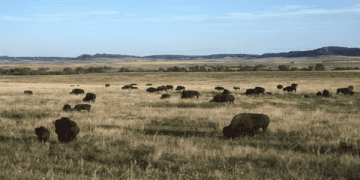The National Bison Association (NBA) and the Canadian Bison Association (CBA) have raised concerns that potential tariffs could disrupt the bison supply chain, negatively affecting agricultural industries in both countries. The organizations have urged officials to avoid further disruptions and to reinstate duty-free trade for live bison, a practice that has supported the agricultural sector for decades and contributed to the recovery of the bison species in North America.
Both the NBA and CBA emphasize the mutually beneficial relationship between the U.S. and Canada, noting that live Canadian bison are imported at an unprecedented rate. According to the organizations, nearly half of all bison processed in the U.S. in 2024 were imported from Canada, supporting a nearly $1 billion industry and a growing sector of American agriculture.
Jim Matheson, Executive Director of the NBA, stated, “The U.S. has long been the primary importer of live Canadian bison, which are finished or sent directly to slaughter here, playing a vital role in supplying the domestic market with healthy, regeneratively raised bison. In 2024, imported live Canadian bison accounted for nearly half of the total bison processed in the U.S., approximately 80,000 head.” He noted that the imposition of tariffs has already caused disruptions, with one major Canadian importer halting shipments to the U.S. immediately after the tariff announcement, a significant issue given the tight supply of market-ready bison.
The U.S. is the largest consumer of bison meat worldwide, and the bison industry in the U.S. relies heavily on the regular importation of live bison to meet the growing demand for clean, naturally raised protein.
Scott Yule, Executive Director of the CBA, explained that tariffs would not only harm the Canadian bison industry but could also have a significant impact on the broader North American bison market. “The U.S. simply can’t meet its domestic demand for bison without Canadian imports. If U.S. consumers are unable to access bison meat from their regular supplier, they may turn to other protein sources, making it difficult to regain their interest in this healthy and popular meat,” Yule said.
The NBA and CBA will continue to monitor the situation and collaborate with officials from both countries to find a resolution that supports the bison industry and ensures the sustainability of the North American bison herd.
Bison, recognized as the National Mammal of the United States since 2016, are considered a success story of conservation in North America, with ranchers and conservationists on both sides of the U.S.-Canada border working together to restore the species.
Your go-to for supply chain report news updates: The Supply Chain Report. For international trade tools, see ADAMftd.com.
#BisonIndustry #AgricultureTrade #SupplyChainImpact #BisonConservation #NorthAmericanTrade















